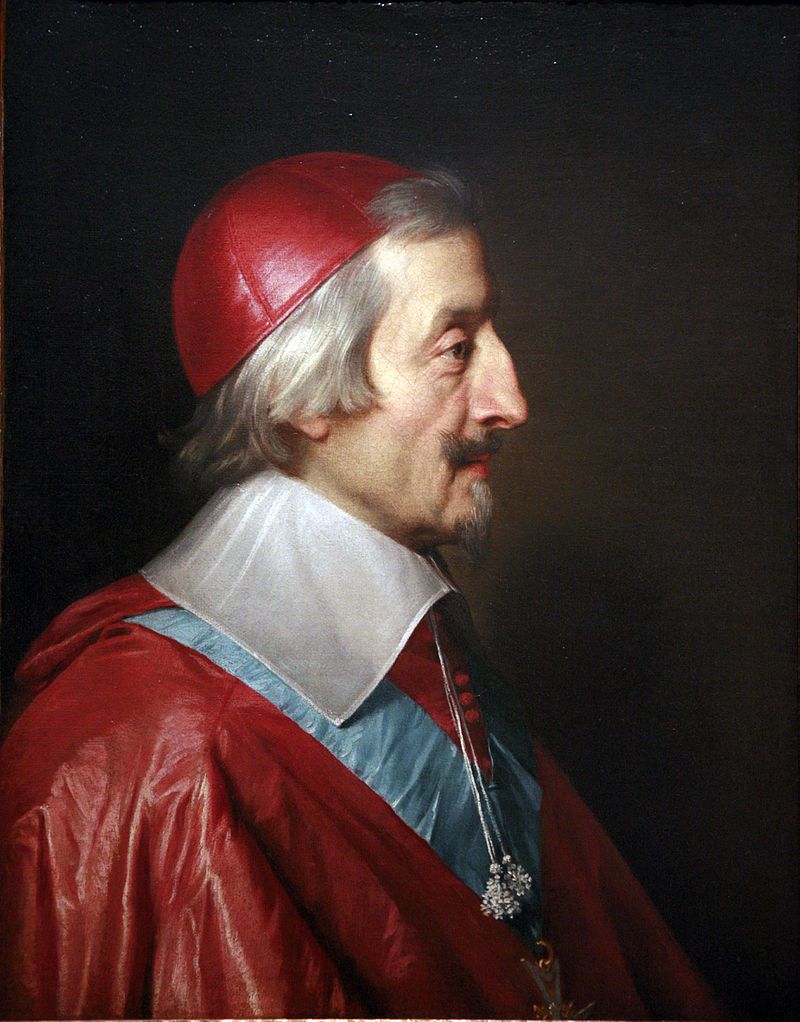
Why did it matter so much for Richelieu? In fact, both Habsburg empires - Austria and Spain - were Catholic, and the French state itself was well-known for its brutality against the Huguenots. If we imagine alternative history, where Habsburgs eventually deposed Bourbons in France to create the third Habsburg-led empire, the France most probably would not disappear as a state. The further period of French history, which lasted from 1789 to 1871, had shown that despite the numerous transitions between three monarchic dynasties (Bourbon, its Orléans branch, and Bonaparte) and various types of republican rule, but the French state itself had not eventually disappeared.
 |
Bourbon France in a Habsburg/Protestant circle during the Thirty Years' War |
Based on that logic, it may be rational enough to conclude that Cardinal de Richelieu acted based not on some raison d'état, but first of all based on his own and the King's interests and needs. Richelieu, despite his powers, was a self-concious servant to Louis XIII, as the Day of the Dupes incident had shown. Neither Richelieu, nor Louis XIII would not appreciate the misery they would encounter in case of their deposition by Habsburgs, not to say the possible loss of life due to the same reason. Therefore, it was necessary for them to save their own lives, not the state. The newly centralized state was just a tool for those genuinly personal interests.
 |
Those moments, when you are nearly dismissed :) See the Day of the Dupes for explanation |
While the definite reason for the creation of the state will forever be debated by historians, the most probable reason was the wealth disparity among people. The physically strong had naturally subdued the physically weak first, and then that disparity had transformed into a property, as physically strong people used to accumulated the wealth incoming from the physically weak. The richest individuals eventually became the rulers of proto-states that developed into organized societies thanks to the property relations. The first documented states emerged in Sumer and Egypt in mid-4th century BC, and, despite all the evolution, the state remains the state, and the role of the state's ruling elite remains practically the same, although in most cases the wealth resource was abandoned in favor of the authority, which is usually gained through interpersonal relations on individual level.
I decided to write the upcoming cycle of articles due to several questions that have been ambiguously answered since the emergence of IR as an independent social science discipline. First, what stands behind the dynamics of the international politics? The physical axiom, which says that nothing happens out of nothing, should be certainly applicable in IR as well. There are reasons for states to take actions. Different theories find different explanations for the dynamics, but anyway there must be the initial ignitor that fires the behavior of the state as a type of a social group, i. e. a grouping of people as social and biological units.
Second, what is the national or state interest we often hear about? I am going to argue it does not originate from the state's or world order's structure. My point will be that every state's purpose is the fulfilling the needs of the state's ruling elite. The only thing in which states differ from one another is the size, or width, of its ruling elite, from a very limited group of individuals in totalitarian states, through a wider groupings in authoritarian states to a large political stratum in democratic states. However, even in democratic states the elite is first of all concerned with their own personal needs and fears.
In order to understand how and which needs rule the international politics, the available research will be useful. I am going to find support in the famous, quite simplistic, but at the same time very "catch-all" pyramid model of needs by Abraham Maslow:
The next issue will be about the "raison d'état" of modern totalitarian countries. We will see how states like North Korea or Saudi Arabia depend on their leaders' personal well-being. Stay tuned.

Комментарии
Отправить комментарий